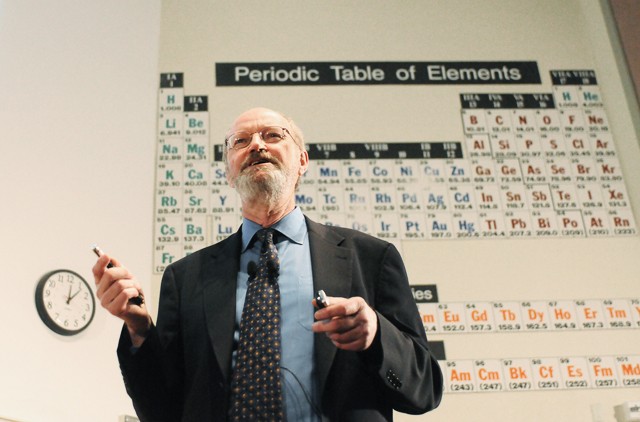A Nobel Prize-winning scientist spoke Tuesday at the University of Minnesota about his path to winning the prize and the current applications of his work. Dr. Robert Grubbs, who won the 2005 Nobel Prize in chemistry, visited the University as part of the Honeywell-Nobel Initiative, which works to connect university students to winners of the Nobel Prize. This is the second time the initiative has brought a winner to the University. Roderick Mackinnon, who won the prize in 2003 for his work in chemistry, visited in 2007. Grubbs said the recognized research was in the area of catalysts, which are substances that cause or accelerate a chemical reaction. The catalyst Grubbs developed led to the conversion of organic molecules and is applied in areas ranging from pharmaceuticals to creating new plastics. The catalyst is unique because it makes a reaction that previously required extremely controlled environments possible in a number of different situations, according to Grubbs. âÄúThe joke is the first person to use the catalyst took it out of a rusty bucket and scraped it in the reactor with a wooden spoon,âÄù he said. Grubbs held a lecture earlier in the day that focused on the path to his breakthrough research and the applications of it today. Grubbs first spoke of what brought him to the world of science: the Soviet UnionâÄôs Sputnik I, the first satellite launched into space. While the United States was building a science infrastructure that could rival the Soviet UnionâÄôs, Grubbs was attending his first year of college. âÄúBuilding this structure allowed me to find an environment that was ripe and ready for me to get involved in science,âÄù Grubbs said. He said that as an undergraduate at the University of Florida he was not a great student, and it wasnâÄôt until he found his focus that he became one. âÄúIt was finding something that I was really interested in,âÄù Grubbs said. âÄúLearning and studying things had a purpose now.âÄù Bess Vlaisavljevich, a graduate student in physical chemistry, said she found GrubbsâÄô lack of commitment early on something to remember in her future career. âÄúWhen I go on to be a professor or teacher I could have a student that doesnâÄôt seem to be interested but still could become interested in the future,âÄù she said. Grubbs said his focus came in the world of organic chemistry, which focuses on carbon compounds. Organic chemistry was an emerging area of science that had little âÄî but excellent âÄîliterature being published, Grubbs said. âÄúI didnâÄôt like to spend a lot of time in the library,âÄù Grubbs said jokingly. âÄúSo at this stage in the field there were about five papers you could read and be an expert.âÄù GrubbsâÄô expertise produced a catalyst that is currently used to make products that range from windmills to products being sold at VictoriaâÄôs Secret. Using GrubbsâÄô catalyst, soybean oil was converted to a material that was used for a bath product sold at the womenâÄôs lingerie and beauty product store. âÄúIt says that it is 100 percent vegan,âÄù Grubbs said. Grubbs said the catalyst uses a reaction that converts materials in a way that is efficient, simple to use and can limit the byproducts that are produced. These characteristics contribute to green chemistry, which Grubbs said produces safe chemicals in a way that reduces waste and the production of carbon dioxide. The audience was composed of students who are studying the concepts Grubbs devoted his professional life to. âÄúBeing able to see someone talk from the field that you are pursuing a career in is just an awesome opportunity,âÄù said Deanna Miller, a graduate student in inorganic chemistry. William Tolman, chairman of the chemistry department, said the focus of the initiative is on the students. âÄúIt is a great opportunity for them to not only hear him in lecture, but there are other activities that allow them to interact in a more personal way with the Nobel Prize-winning scientist,âÄù he said. One other way the students were allowed to talk to Grubbs was at âÄúRoad to Nobel,âÄù a small group discussion that allowed select students to ask Grubbs questions. Although many of the studentsâÄô questions focused on the technicalities of GrubbsâÄô research, some students asked Grubbs questions on the qualities he looks for in a current undergraduate or graduate. âÄúReally, what you want in a student is not only someone that has the ability, but you really want someone that has the drive to do it,âÄù Grubbs said. Grubbs stressed the importance that students find their passion early on. Elizabeth Gorecki, a physiology and biomedical engineering sophomore, said she found this point important. âÄúI liked how he stressed the importance of undergraduate research in determining the rest of your life,âÄù she said. When asked about the timing of the award, Grubbs said he won the award at the perfect time. âÄúI was young enough to still be able to enjoy it, but old enough to not have to do it again,âÄù Grubbs said.

2005 Chemistry Nobel Prize winner Robert Grubbs lectures on commercial applications of polymers as part of Honeywell-Nobel Initiative Public Lecture on Tuesday at Smith Hall.
Nobel Prize winner visits University
Dr. Robert Grubbs spoke at the University as part of the Honeywell-Nobel Initiative.
Published March 3, 2010
0

